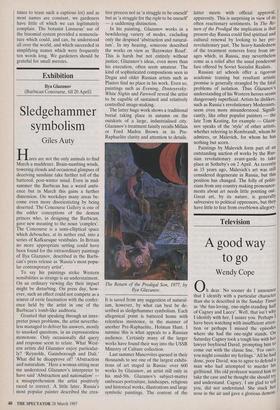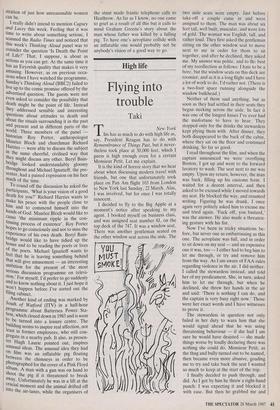Television
A good way to go
Wendy Cope
0 h dear. No sooner do I announce that I identify with a particular character than she is described in the Sunday Times as 'the fun-loving, one-night-standing half of Cagney and Lacey'. Well, that isn't why I identify with her, I assure you. Perhaps I have been watching with insufficient atten- tion or perhaps I missed the episodes where she had the one-night stands. On Saturday Cagney took a tough line with her lawyer boyfriend David, prompting him to come out with the classic line, 'For once, you might consider my feelings.' All he had done, poor David, was to agree to defend a man who had attempted to murder his girlfriend. His old professor wanted him te take the case and he thought she should try and understand. Cagney, I am glad to tell you, did not understand. She stuck her nose in the air and gave a glorious demon- stration of just how unreasonable women can be.
I really didn't intend to mention Cagney and Lacey this week. Feeling that it was time to write about something serious, I scanned the Radio Times and noticed that this week's Thinking Aloud panel was to consider the question 'Is Death the Point of Life?' That, I suppose, is about as serious as you can get. At the same time it has an Eeyorish quality that makes it very amusing. However, as on previous occa- sions when I have watched the programme, Sunday's Thinking Aloud (BBC2) failed to live up to the comic promise offered by the advertised question. The guests were not even asked to consider the possibility that death might be the point of life. Instead they addressed sensible and interesting questions about attitudes to death and about the rituals surrounding it in the past and present and in different parts of the world. Three members of the panel — historian Roy Porter, anthropologist Maurice Bloch and churchman Richard Harries — were able to discuss the subject in the same cheerful, civilised way that they might discuss any other. Beryl Bain- bridge looked understandably gloomy throughout and Michael Ignatieff, the pre- senter, had a pained expression on his face much of the time To round off the discussion he asked the Participants, 'What is your vision of a good death for you?' Richard Harries wants to make his peace with the people close to him and to commend himself into the hands of God. Maurice Bloch would like to cause 'the minimum ripple in the con- tinuing process of existence'. Roy Porter hopes to go consciously and not to miss the experience of his own death. Beryl Bain- bridge would like to have tidied up the house and to be reading the poets or lives of the poets. Michael Ignatieff wants to feel that he is leaving something behind that will give amusement — an interesting ambition for the present of 'the most serious discussion programme on televi- sion.' For myself, I'd prefer to go suddenly and to know nothing about it. I just hope it won't happen before I've sorted out the filing cabinet.
Another kind of ending was marked by South of Watford (ITV) in a half-hour Programme about Battersea Power Sta- tion, which closed down in 1983 and is soon to be turned into a leisure centre. The building seems to inspire real affection, not least in former employees, who still con- gregate in a nearby pub. It also, as presen- ter Hugh Laurie pointed out, inspires unusual ideas. The unusual idea they had On film was an inflatable pig floating between the chimneys in order to be Photographed for the cover of a Pink Floyd album. A man with a gun was on hand to Shoot the pig if it threatened to break away. Unfortunately he was in a lift at the crucial moment and the animal drifted off into the air-lanes, while the organisers of the stunt made frantic telephone calls to Heathrow. As far as I know, no one came to grief as a result of all this but it calls to mind Graham Greene's story about the man whose father was killed by a falling pig. To have one's aeroplane collide with an inflatable one would probably not be anybody's vision of a good way to go.



















































 Previous page
Previous page